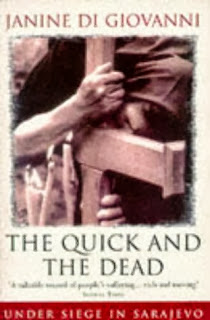Non-fiction. History books. Science for amateur readers. Politics. Social sciences. Essay collections. War reporting. Travel writing. All of them and more reviewed by the Bookworm. Pulp fiction not allowed.
Friday 20 September 2013
Janine Di Giovanni, The Quick and the Dead
I do like Janine Di Giovanni's reporting style. She's compassionate without being sentimental, her images vivid but not overly dramatic. Compared to other books about wars in the former Yugoslavia, hers truly shine.
The Quick and the Dead is a tiny booklet, only 177 pages. It is fully focused on the infamous siege of Sarajevo. Between 1992 and 1994, Di Giovanni made repeated trips to the suffering city. As you can probably imagine, her reports are not too happy. War doesn't paint beautiful pictures. Still, stories of ordinary people in exceptional circumstances are very powerful. Sure, fear and horror were omnipresent, but if you looked hard enough, you could also find defiance, dignity and courage. The bittersweet mixture, when described by a skilled writer, touches the heart.
Funny thing, if I were to label The Quick and the Dead as a single genre, I would choose travel writing. The good travel writing, I hasten to add, like Dervla Murphy's, not some magazine-sponsored holiday-in-the-sun gibberish. Di Giovanni is an active participant in the events, always on the move from one location to the next. She shares her worries, fears, heartbreaks, and if the story she's about to relate is somebody else's, she describes where and how she met the source.
By the way, one of Janine's sources went on to write her own book. Atka Reid, the author of Goodbye Sarajevo, makes a quick appearance in Di Giovanni's memoir. As you can see from my review, I don't much value Reid's literary efforts, but at least here's someone confirming her story :)
Wednesday 18 September 2013
Charles Panati, Panati's Extraordinary Origins of Everyday Things
Things are happening slowly in the Bookworm's Cave these days, for which I apologise. Life has been hectic recently: new jobs for me and mine, urgent family matters and a new hobby firing up my imagination. To add insult to injury, I've hit a patch of really boring books, readable but only just.
Touch wood, it looks like some free time is coming my way so the days of neglect are probably over now. :)
I wish I could start my outburst of blog activity with a rave, but unfortunately Panati's Extraordinary Origins of Everyday Things does not merit such kudos.
First and foremost, I absolutely hate titles like Someone's Something. The author's name is already on the cover, goddamnit, why on Earth would you want to put it there twice? A bloated ego? Some misguided marketing advice? Nah, I'm not buying this, Mr Panati.
The 'extraordinary' part is somewhat exaggerated, too. What's so extraordinary about inventing a dishwasher? A lawn mower? A hand mixer? An inventor wants to make some money and tinkers away in his garage until he finds something patent-worthy, end of story. Where's the amazing part? Sure, the book contains some good anecdotes, but when it comes to the 'wow factor' it's a definitive oversell.
Most of Panati's Extraordinary Origins of Everyday Things is focused on modern inventions. Items of ancient or medieval pedigree are far outnumbered by Victorian/early twentieth century innovations. I'd prefer it the other way round but ok, that's just one girl's opinion.
As to reliability - ouch. I've found a good handful of factual mistakes, some of them pretty glaring, without looking too hard. NOT a serious source of information, please double check every sentence before passing it on as true.
If I were to pick one word to best describe Panati's creation, it would be 'tabloidish'. Gossip, sensation, and lots of verbal photoshop.
Having said all that, the book doesn't read too bad. Easy on the brain, it's a bit repetitive but smooth. I can wholeheartedly recommend it for bathroom literature. One-sitting-size chapters are simply perfect for the job...
Monday 2 September 2013
Sarah Gabriel, Eating Pomegranates
I wish I had no reason to learn more about breast cancer, but unfortunately that is not the case. I chose Eating Pomegranates as a gentle introduction to the topic. You see, I thought it will be one of those 'got cancer, ate wonder food (whatever is currently in fashion), right as rain twenty years on' books.
Guess what, I was wrong. Sarah Gabriel's pomegranates are the mythological ones: six grains that sentenced Persephone to spend half her existence in the underground kingdom of Hades. Accordingly, the book is not about the latest fads in cancer-fighting foods. It's much heavier than that, dark, almost depressing and painfully realistic.
The author was diagnosed with breast cancer in 2006, while still in her forties and with two young children in the house. The journey from diagnosis through treatment to (hopefully!) health was a nightmare. Gabriel is honest about her experiences: there were no pink ribbons and uplifting slogans, only fear, worry and sorrow while family life was crashing down all around her.
Eating Pomegranates is not really the best proposition if you want to learn about technicalities of treatment or the illness itself. Some basic data are there, sure, but this definitely isn't a textbook. If, on the other hand, you want a peek at the emotional landscape of a cancer patient - bingo. NOT something a sane person would choose to read for fun but I imagine that women going through similar hell will find plenty of reassurance in Sarah Gabriel's diary. While happy ending is not exactly the leitmotif, it must be a relief to see that it's ok to be scared, to be sad, to break down under the disease. After all, heroes crop up only on motivational posters, the rest of us are simply human.
Subscribe to:
Posts (Atom)



